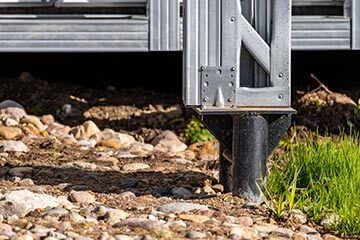Your tradesperson should replace or repair poor workmanship free of charge if they’re in breach of their contract. They should also do this within a reasonable amount of time.
If you’ve spoken to your tradesperson and they refuse to repair the damage, you could try Alternative Dispute Resolution (ADR).
If this doesn’t work, you can use home insurance legal cover to take legal action. That’s as long as you have this on your home insurance policy. Here’s how you can resolve a poor workmanship dispute.

What are my rights with poor workmanship?
The Consumer Rights Act 2015 states that services must be provided with reasonable care and skill. But it goes further by laying down minimum standards. For example:
- Any information provided in a written or verbal format is binding, if the customer relies on it
- If the fee isn’t agreed before work starts, it must be provided for a reasonable price
- The service must be carried out with reasonable care and skill and in a reasonable time – unless a particular timescale had been set out and agreed
If the service doesn’t satisfy these criteria, you can request a remedy. The trader should either:
- Redo the element of the job that isn't up to good standard
- Redo the entire job at no extra cost and within a reasonable time frame
If this isn't possible, you can request a price reduction. How much depends on the quality of the original work. You should receive your price reduction within 14 days of any agreement.
How to deal with poor workmanship
Here’s how you can fix poor workmanship:
1. Speak to your trader
Speak to your trader directly first. Before you start the conversation, be clear in your own mind what the problem is - and how you’d like it resolved.
The best case scenario is that you agree on a course of action.
If the conversation happens over the phone or in person make a note of what you agreed.
Then send a letter, email or text message confirming what you've agreed to and when the work is going to take place.
2. Gather evidence
Keep copies of:
- Contracts
- Conversation details
- Receipts
- Paperwork
- Plans of the work they’re going to do
- Photographs or videos
You should also keep track of dates, times and the names of the people that work on the property. This information is useful for building a case against your builder if they don’t cooperate with you.
3. File a complaint with your builder
If talking to your builder or tradesperson doesn't work, it's worth checking if the company has a complaints procedure.
If it doesn’t, you can use Citizens Advice’s poor workmanship complaint letter template. This shows you how to make a formal complaint for poor quality work.
4. Try an alternative dispute resolution
If your approaches haven’t worked, try Alternative Dispute Resolution (ADR). This is an alternative way to settle disputes between consumers and traders without going to court.
It’s often quicker and less expensive, and involves mediation and arbitration.
Mediation is where an independent third party helps bring the 2 sides together to facilitate a solution.
Arbitration is when an independent third party considers the facts and makes a decision that’s binding to either one or both parties.
Not all builders have to be part of an ADR scheme, but those who are usually have a trusted trademark, or they’re part of the Federation of Master Builders.
5. Speak to your home insurance provider
If your builder isn’t part of ADR and you can't resolve the dispute between you, speak to your home insurance provider.
They should be able to offer advice on what to do, whether that’s taking legal action or something else.
If you decide to take your tradesperson to court then your home insurance should cover your legal expenses if it’s part of your policy. They're only likely to take your case if they think you have a reasonable chance of winning though.
Legal expenses are included as standard on some home insurance policies. You can also add it as an optional extra to both your buildings and contents policy. You can find out if you have legal expenses cover and the amount it covers in your policy documents. You can also speak to your insurer directly.
“You can’t claim on your home insurance for damage caused by your builder or tradesperson. Your tradesperson's liability insurance should cover this.
“Legal cover on your home insurance can help you if there’s a problem with your tradesperson’s work. But it’s worth trying to settle the issue with them first through the firm’s complaints procedure or using ADR.
“If you’ve already tried this, your home insurance legal cover can help you cover the legal costs if you need to take your tradesperson to court.”
What our home & lifestyle insurance expert says

6. Suing your tradesperson
Suing your tradesperson could be expensive. So it’s worth comparing the cost of taking the case to court over fixing the damage with another builder.
As we mentioned, you might have legal cover on your home insurance policy to help cover the cost. You might choose to sue your builder or tradesperson if:
- You don’t have legal cover on your home insurance
- The builder wasn’t part of the ADR scheme
- Your insurer decided it’s not worth them pursuing the case
Remember, you can always seek legal advice from Citizens Advice. Some law firms offer legal advice for free, too.
If you need more help
You can contact the Citizens Advice consumer helpline on 0808 223 1133. Trained advisers can give you support over the phone – or you can use an online form.
What counts as poor workmanship?
Poor workmanship is any job that's not done to a reasonable standard.
This could be due to:
- A tradesperson using materials that aren't up to the job
- Failing to take necessary care or apply necessary skill
- Failing to install or build something correctly
Here are some examples of poor workmanship scenarios and what you can do about them:
What if the trader hasn’t done what you agreed?
Your tradesperson has broken their contract, so you can ask them to rectify the work. That’s why it's best to have a written contract as it makes it hard to argue against.
What if the trader has done something dangerous or unsafe?
First, stop using anything that’s unsafe. The next steps depend on the work:
- If it’s an electrical appliance, switch it off and unplug it immediately
- If the trader has burst a pipe, turn your water supply off immediately
- If it’s a gas appliance – particularly if you can smell gas – call the National Gas Emergency Service on 0800 111 999
You can report dangerous or unsafe buildings/structures to your local council. If it’s outside working hours, you can do this online if you live in England and Wales.
Finally, report your tradesperson to Trading Standards and provide them with the following details:
- Who was the tradesperson who did the work?
- What did the work involve?
- When did the work start?
- How much did it cost?
- Have you already raised a complaint against the tradesperson?
They might be able to give you tailored advice for your situation. But you could also follow the steps we mentioned earlier:
- Raise a formal complaint with the tradesperson
- Use an ADR service
- Speak to your home insurance provider if you have legal cover on your policy
What should I do if I've paid the builder and they've not finished the job?
This is slightly different to poor workmanship, but you need to handle it in a similar way:
- Keep talking to your tradesperson regularly and leave the lines of communication open
- Give your builder a chance to finish the work – unless you’ve given them a finish date
- If you've agreed to a time extension, put it in writing
- If they've missed the deadline, and you don't want the builders to continue, put that in writing
You should then pay the builders for the work completed so far.
Depending on the situation, you may want to ask for a discount to cover the inconvenience. If you’ve already given them a large deposit, negotiate to see if they refund some money.
The Financial Ombudsman can help you resolve your situation if your builder has failed to respond to you. They can help you if:
- Your builder doesn’t use ADR
- You’ve paid by credit or debit card
- You’ve paid by PayPal
- You’ve paid by mobile payment, for example, Apple Pay
What if the trader charges more than expected?
It depends on whether they gave you a quote or an estimate.
Traders can’t charge you more than the quote they've given you unless there’s a good reason. For example, if they warned you that they’d need to do extra work.
If it was an estimate and the final bill was a lot higher than expected you can question this.
The final price should be reasonable – although what constitutes 'reasonable' isn’t always clear.
Getting a second opinion from another tradesperson is a good starting point. They can either:
- Reassure you that the price for the work is reasonable
- Tell you if there's been any price inflation
Either way, if you’re unhappy with the price then discuss it with the trader. Let them know what you think is reasonable – preferably in writing.
Chances are you have to negotiate with the trader to reach an agreement.








